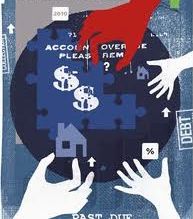 (Bloomberg) -- Early in “Money, Power and Wall Street,” a two-night, four-hour investigation by “Frontline”into the 2008 financial crisis, former JPMorgan Chase & Co. (JPM)’s investment bank Co-Chief Executive Officer Bill Winters recalls a 1994 staff retreat in Boca Raton, Florida.
(Bloomberg) -- Early in “Money, Power and Wall Street,” a two-night, four-hour investigation by “Frontline”into the 2008 financial crisis, former JPMorgan Chase & Co. (JPM)’s investment bank Co-Chief Executive Officer Bill Winters recalls a 1994 staff retreat in Boca Raton, Florida.
The gathering was as boisterous as it was momentous.
“I went into the pool fully clothed,” says Winters. “So did my boss.”
More than alcohol fueled the high spirits. A team of JPMorgan bankers, all in their 20s, had just dreamed up a new insurance product for loans that would bring absurdly huge profits. Their invention of the credit default swap set in motion a path to untold riches and global crisis.
Frontline certainly isn’t the first to report the Boca Raton tale -- “Fool’s Gold” author Gillian Tett receives on-air credit -- or the “too big to fail” days of 2008. But the series’ first two hours (parts three and four were not finished in time for review) do an exemplary job of walking viewers through a 14-year saga defined by daunting complexity.
Compelling History
With access to Wall Street players -- and the top reporters who covered them, including Joshua Green of Bloomberg Businessweek -- “Frontline” assembles a compelling history.“Money, Power and Wall Street” is demanding -- this isn’t Finance for Dummies -- but it’s a compact and thorough lesson.
Series producer Martin Smith steers a first hour highlighted by interviews with the JPMorgan bankers who created those profitable new financial tools. Blythe Masters, for one, recounts the company’s first credit default swap (for Exxon (XOM), stung with billions in losses from the Valdez oil spill). Derivatives trader Terri Duhon details JPMorgan’s expansion of the practice to multi-investor portfolios.
Other banks soon joined the unregulated free-for-all, with an increasing reliance on risky but profitable credit default swaps tied to home mortgages. Politicians of all stripes turned a blind eye.
Financial consultant Satyajit Das tells “Frontline,” “We were just moving the risk from one party to another party.”
“You could just about drive by a bank and they’d throw a loan paper in your car as you passed by,” says Roy Barnes, the Georgia governor routed from office in 2002 after angering the banking lobby with a tough (and soon gutted) predatory lending law.



